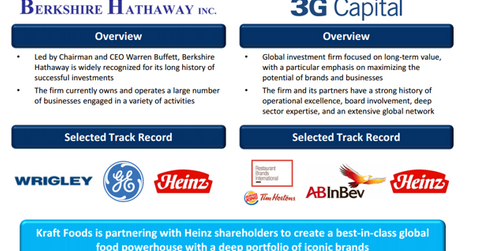The Kraft–Heinz Merger: What If the Deal Breaks?
The Kraft–Heinz merger isn’t a typical risk arbitrage deal because you can’t arbitrage a spread. Before the deal, Kraft was trading at $62.40 a share.
April 9 2015, Updated 1:54 p.m. ET

Scenario analysis: A key part of merger arbitrage
The Kraft–Heinz merger isn’t a typical risk arbitrage deal because you can’t arbitrage a spread. Heinz doesn’t trade and your consideration is cash and stock in the combined company. Buying Kraft (KRFT) stock for the deal involves making a valuation bet. In Part 9 of this series, we’ll estimate the implied valuation of Kraft’s stock price. In other words, you can’t calculate a risk-to-reward ratio because the reward is uncertain.
What’s your downside if the deal breaks?
Before the deal, Kraft was trading at $62.40 a share. If the deal breaks, does the stock go back to that amount? That’s probably the best guess.
The bigger question is what would cause the break. There doesn’t appear to be any major antitrust issues here as the companies are largely complementary. A typical consumer would put Heinz ketchup on their Oscar Mayer hot dog.
Kraft stock has gone from $62.40 to roughly $90. Of that increase, $16.50 is accounted for by the special dividend. The rest is the Buffet bet—the bet that Berkshire Hathaway (BRK-B) and 3G will add about $6.5 billion in value to the combined entity.
There are two reasons why the deal would break:
- a material adverse effect at Kraft—which will be discussed later in the series
- a failure to get the requisite shareholder vote
Arbitrageurs will be focusing on the background section of the proxy statement once it’s released. If it breaks because of a MAC (material adverse change) at Kraft, the pre-deal price is probably a best-case scenario.
Merger arbitrage resources
Other important merger spreads include the deal between Time Warner Cable (TWC) and Comcast (CMCSA) as well as the merger between Pharmacyclics (PCYC) and AbbVie (ABBV). For a primer on risk arbitrage investing, read Merger arbitrage must-knows: A key guide for investors.
Investors who are interested in trading in the consumer discretionary sector should look at the Consumer Staples Select Sector SPDR Fund (XLP) or the iShares Global Consumer Staples ETF (KXI).
